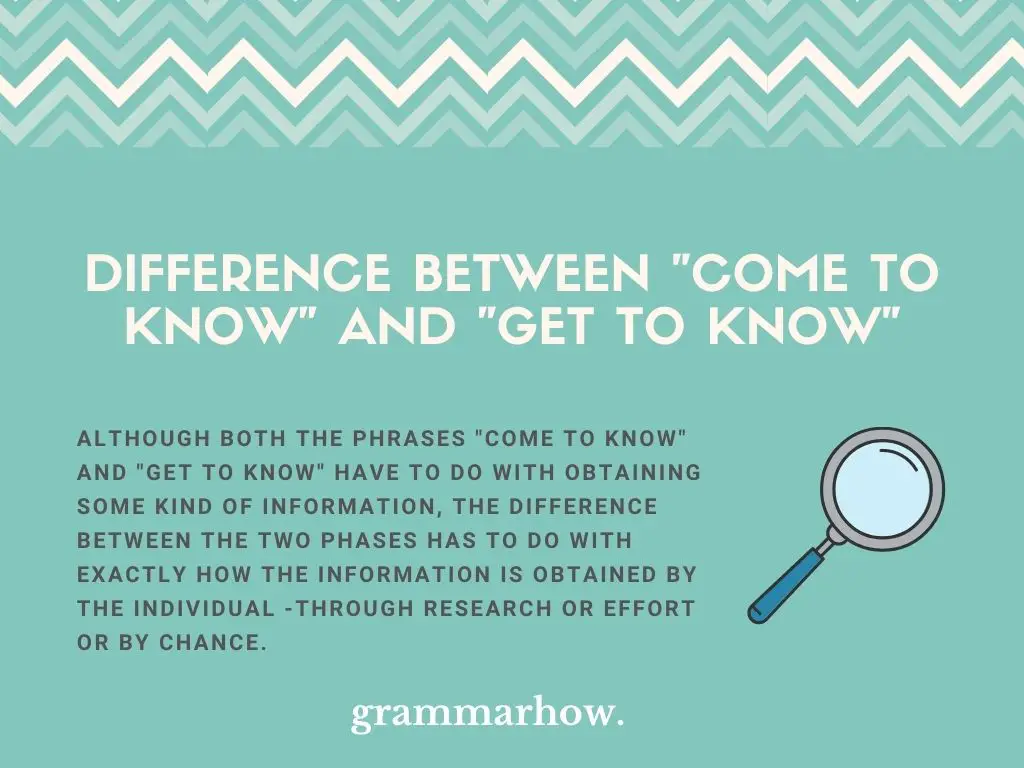“Come to know” and “get to know” are both phrases commonly heard in conversation and informal English. You may wonder if they are interchangeable or if you are using them properly. Here we talk about the differences between these two phrases and help you learn proper context for each.
What Is The Difference Between “Come To Know” And “Get To Know”?
Although both the phrases “come to know” and “get to know” have to do with obtaining some kind of information, the difference between the two phases has to do with exactly how the information is obtained by the individual -through research or effort or by chance.

If you say “come to know” it implies that you didn’t put much effort into obtaining the information, whereas “get to know” means that you want to put work in (or have put work in) to find out more.
What Does “Come To Know” Mean?
The phrase “come to know” implies that the individual was led toward the information or knowledge and may not have particularly sought it out on their own. However, there was a process that was followed to arrive at the information.
In The Cambridge Dictionary, the word “come” means “to happen,” and therefore “come to know” could be rephrased as “happen to know,” which suggests that somehow the knowledge happened.
Let’s look at some examples of the common usage of this phrase.
- I know he seems unapproachable at first, but you will soon come to know that Jim is a kind and generous man.
- The professor said that by taking the class I would come to know how much technology influences our daily lives.
- How did you both come to know each other? You don’t seem to have very much in common.
See how in the sentences, the knowledge that was arrived at only happened after a bit of time or completing a process.
What Does “Get To Know” Mean?
The phrase “get to know” suggests that some work or active research has been put into obtaining the information. The individual actively sought it out somehow and through some kind of effort rather than passively coming across it.
The Cambridge Dictionary defines “get” as “to obtain or buy something.” In this case, the word “obtain” signifies an action on the part of the individual doing the obtaining.
These examples can help clarify better.
- Before you cast your vote, make sure that you take some time to get to know each of the candidates and their positions.
- You should make an effort to get to know the people you work with better by associating with them outside of work. It can make for a better work environment.
- If you’re getting ready for a job interview, it’s a good idea to get to know as much about the company as you can before you walk in the door.
Notice how in these examples the individual needs to perform some action or do some research to arrive at the desired knowledge.
Can “Come To Know” And “Get To Know” Be Used Interchangeably?
You will come across instances in conversations when “get to know” and “come to know” are used interchangeably, as the differences in their meaning are subtle, but “come to know” is passive voice, and “get to know” is active voice, so effort should be made to use them as such.
See how in these examples, changing the phrase changes the meaning of the sentence ever so slightly.
- You should really work to get to know a neighborhood before you buy a house, just to make sure it will be a good fit for you and your family.
- It is only after you move into a neighborhood that you will come to know if it is a good fit for you and your family.
The first sentence in the example states that you should do work to know the neighborhood before you buy a house and move there. The second sentence states that it is only after you move into a neighborhood that you will really know it, and that happens by living there.
Is “Come To Know” Or “Get To Know” Used The Most?
Up until the early 1950s, the phrase “come to know” was used more frequently in the English Language. During the rest of the 1950s, they were both used about the same. After 1967, “get to know” became more popular and continues to be used the most to this day.
This Google Ngram Viewer shows the trends of the two phrases from 1800 until today. You can see from the graph the way that over time the usage of the two phrases changed and “get to know” became the more popular terminology by far.

What Is The Difference Between “Come To Know” And “Came To Know”?
Both “come to know” and “came to know” are passive and imply a process that will occur (or has occurred) to obtain the knowledge. The difference is that “come to know” means that you will obtain the information in the future and “came to know” means that you already obtained the information.
Look at these examples to see the difference:
- I came to know him better after many conversations that we had waiting for the bus each morning.
- After you’ve had your new job for a few weeks, you will come to know what your manager expects from your performance.
In the first example, the person has already gotten to know the person better and is reflecting back on how they did it. In the second example, the person does not yet know what their manager expects but will find out in the future.
What Is The Difference Between “Get To Know” And “Got To Know”?
The difference between “get to know” and “got to know” is when the knowledge is (or was) obtained. For “get to know,” the individual has not yet obtained the knowledge or information. “Got to know” means that the person has already worked to find out the information.
You can see the difference in these examples below.
- You should get to know your way around the city so that you don’t have to stop and ask for directions.
- I got to know the best restaurants in town by talking to people who have lived there a while and asking where the regulars liked to go.
Again, in the first example, the person does not yet know their way around the city but will work to find out. In the second example, the person already asked around and did their research to get the knowledge they desired.
“Come To Know” And “Get To Know” – Synonyms
There are other ways that you can say “come to know” or “get to know.” Below are some synonyms that you can choose to use in place of either of the phrases.
“Come to Know” Synonyms
- Learn
- Discover
- Observe
- Notice
- Become familiar with
“Get to Know” Synonyms
- Familiarize yourself
- Research
- Look into
- Assess
- Explore
Notice how some of these synonyms can be used for both of the phrases, further reiterating that they are very similar in meaning and often used interchangeably in conversation and everyday language.
You may also like: “Happen To Know” – Meaning Explained (With Examples
